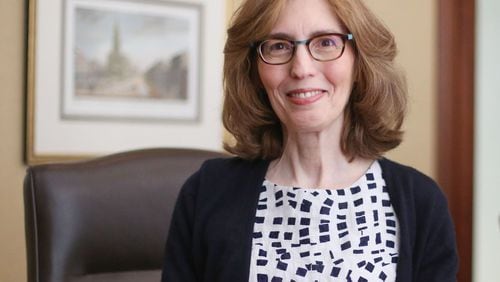There’s no denying one thing about Linda Klein: once the Atlanta lawyer sets her mind on something, she makes it happen.
She graduated from high school at 16, from college at 20, and from law school at 23. In 1997, she became the first woman to serve as president of the State Bar of Georgia, a decade after she made it her goal to hold the position.
On Monday in San Francisco, Klein, 56, will assume another position she set her sights on years ago. She will become the next president of the American Bar Association, the world’s largest legal organization with more than 400,000 members.
“I am honored and privileged,” Klein said. “I decided to become an attorney because I want to help people and bring greater access to justice for those who need it.”
The ABA and state bar associations, she said, “are avenues to do just that.”
Klein will be sworn in by her longtime friend, Georgia Supreme Court Justice Carol Hunstein.
"Linda Klein has earned the respect, admiration and affection of her clients and members of the legal profession through her skill, commitment to the rule of law and leadership with the State Bar of Georgia and the American Bar Association," Hunstein said. "She is truly the definition of a counselor at law."
Known for her tireless work ethic, Klein is a senior managing shareholder at Baker Donelson, a 700-lawyer firm with most of its 20 offices located across the South. She specializes in business dispute resolution and has worked with clients in higher education and the construction industry.
Her reason for studying law
Klein, who grew up in Queens, N.Y., is a product of the New York public school system. She cites her late grandfather as a major influence in her life.
When she was a child, he told her what it was like being a grocer during the Depression and how he abhorred that relief agencies decided what food people could eat from week to week, regardless of their ethnicity or culture.
“He would say to me, ‘You should never treat people like that,’” Klein recalled. “That impressed upon me the importance of treating all people with dignity and respect.”
Her grandfather also offered her a bit of advice that she followed years later: Go to law school so you can help people.
‘We owe’ our military veterans
When Klein became the first woman to head Georgia’s bar association, her top priority was securing $2 million in funding so indigent victims of domestic violence would have access to lawyers. Since then, state lawmakers have continued its funding, helping thousands of vulnerable Georgians.
During her one-year term as ABA president, Klein will make providing legal aid to veterans her top priority.
In a recent interview in her firm’s office across from Lenox Square, Klein quickly ticked off one troubling statistic after another: There are 50,000 homeless veterans in the country. An estimated 1.4 million veterans live below the poverty level. About an equal number live just above the poverty level.
"These are the people who took an oath to die for us in defense of democracy and the rule of law," she said. "We owe them more as a nation. And the legal profession is all about the rule of law, so we're going to answer our own call and our own oath and we're going to help them."
Vision, energy and passion
Klein tapped two lawyers to head a committee that will study what can be done now to help as many veterans as possible with their legal problems, and what can be done for them in the future.
When Vice Adm. Nan DeRenzi was asked to co-chair the panel, she had been retired from the U.S. Navy for less than a year and didn’t know if this was how she wanted to be spending her time. But then she sat down with Klein.
“It didn’t take me two minutes in that woman’s presence for me to say, ‘Whatever she’s involved in, I’m in, too,’” DeRenzi, a former Judge Advocate General, said. “The vision, energy and passion she has are just incredible. And she has seen first-hand (that) what might be a small thing for a lawyer to do can be an enormous thing for those who need help the most.”
Fellow co-chair Dwight Smith, a Tulsa, Okla., attorney, said he has personal reasons for volunteering to serve. His two sons and son-in-law are all in the military.
As for Klein, he said, "Linda has devoted years to the ABA and the legal profession. I don't think there's any lawyer more qualified to be the next ABA president. I think she'll be an outstanding leader."
Free legal services for veterans
The ABA will seek to bring lawyers into partnerships with members of the medical profession for veterans who need both kinds of help, Klein said. Another challenge is linking lawyers in one state to lawyers in another state who can help the same person.
“When a veteran comes to see a lawyer like me in Atlanta and has a problem, that veteran may live here but he’s originally from Illinois and he was deployed out of Virginia,” she said. “Sometimes their problems — maybe some domestic issue like child support or a creditor’s lien — are in some other state. We need to figure out how to get everybody together so we can solve the problem.”
On two occasions over the next year — once around Veteran’s Day, the other close to Memorial Day — lawyers will be asked to spend a day providing free legal services to veterans, Klein said.
“We want to get as many lawyers in the country involved as possible,” she said. “And I suspect they spend more than one day, because once you do a pro bono case, you’re hooked. It reminds you of why you went to law school — to help people.”







